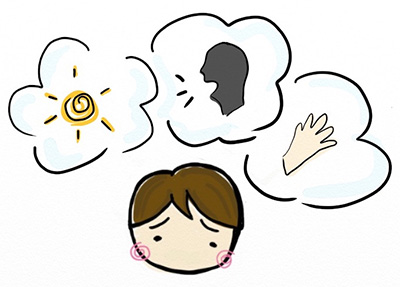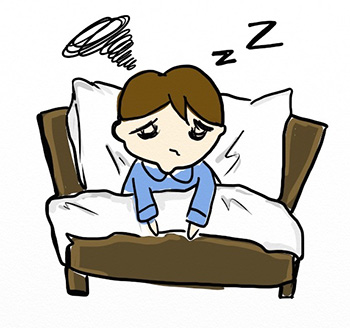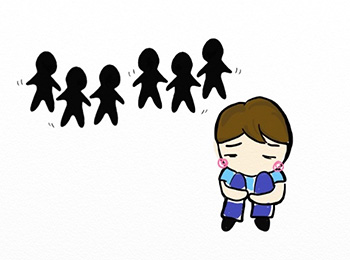Causes of sleep problems
◅ Sleep & ASDIn general, factors contributing to sleep problems in children and adolescents.
Sleep problem is a common symptom among children with ASD. Researchers have investigated the causes of sleep problems among children with ASD from different possible aspects, such as:
1. Sensory over-responsivity

2. Anxiety

Children with ASD usually have high scores in anxiety assessments, meaning these children could be especially vulnerable to anxiety. Research has found an association between high levels of anxiety and sleep problems in children with ASD. Therefore, anxiety could be one of the factors contributing to poor sleep in children with ASD.
3. Abnormal levels of melatonin production

Melatonin is a hormone in the brain that promotes sleep onset. When light received by the retina is scarce during the night, melatonin kicks in. In opposite, melatonin drops when morning approaches. This mechanism maintains our sleep-wake regulation. Research has reported that children with ASD produce abnormal levels of melatonin compared to typically developing children.
That could be one of the factors contributing to the poor sleep-wake routine in children with ASD. Researchers have been thinking that such deficits in melatonin secretion might be influenced by certain genes.
4. Social communication difficulties

Apart from natural environmental cues (i.e. daylight and darkness) and our body's internal clock, human also make sense of social cues to regulate their sleep-wake cycle. A lot of children with ASD have difficulties communicating and interpreting social cues (e.g. making sense that it's time for them to go to bed when they see their siblings brush their teeth, or when they see parents switch off some of the lights and point at their beds).
Thus, these children may also have difficulties utilizing these social cues to maintain their regular sleep-wake routines.
5. Allergies
Research has found that the prevalence of allergic diseases are more commonly found in children with ASD than typically developing children. Allergies, such as allergic rhinitis, can affect a child's sleep. It may even increase the risks of suffering from obstructive sleep apnea. In order to soothe symptoms of allergic rhinitis, it is recommended that the child's bedroom is well ventilated and clean, and that his/her pillows, duvets and soft toys on bed are regularly washed. If such symptoms of allergic rhinitis ring alarm bells, parents should seek medical consultation for appropriate treatments.
References
- Lin, T., Lin, P., Su, T., Chen, Y., Hsu, J., Huang, K., . . . Bai, Y. (2014). Autistic spectrum disorder, attention deficit hyperactivity disorder, and allergy: Is there a link? A nationwide study. Research in Autism Spectrum Disorders, 8(10), 1333-1338.
- Melke, J. , Botros, H. G. , Chaste, P. , Betancur, C. , Nygren, G. , Anckarsäter, H. & Rastam, M . (2008). Abnormal melatonin synthesis in autism spectrum disorders. Molecular psychiatry, 13(1), 90-98.
- Richdale, A. L. (2008). Sleep problems in autism: prevalence, cause, and intervention. Developmental Medicine & Child Neurology, 41(01), 60-66.
- Richdale, A. L., & Schreck, K. A. (2009). Sleep problems in autism spectrum disorders: prevalence, nature, & possible biopsychosocial aetiologies. Sleep medicine reviews, 13(6), 403-411.
